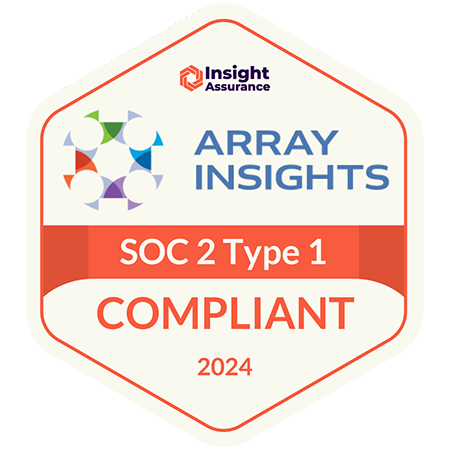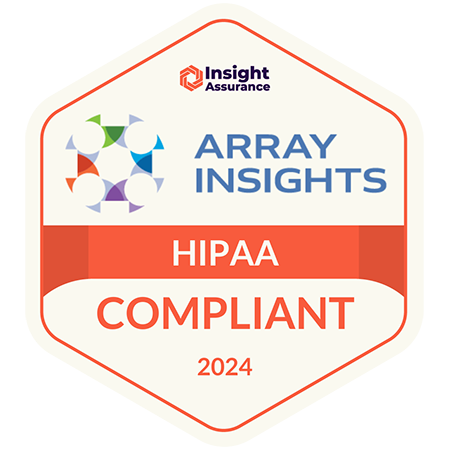How Can I Multiply My Impact in Healthcare?
By: Anne Kim, Co-Founder and CEO of Array Insights
People want you to be good.
The great British actor Sir Patrick Stewart shared these six simple, yet profound words in an interview recently. Stewart, of Star Trek fame, was alluding to a lesson he’d learned throughout his life and acting career.
In competitive environments, it’s easy to be conditioned into thinking “everyone’s against me.” We all know that little voice of doubt in the back of our minds. But, as Stewart points out, most people actually want you to be good; to be good at whatever task.
Optimistically, it’s because they want you to succeed. In a more pessimistic sense, they don’t want you to waste their time. Either way, they genuinely want you to be good in that moment. If we operate on the assumption that no one’s trying to sabotage us, we can approach new challenges with a bit more confidence.
Whether I’m speaking to investors, sales prospects or potential partners, I try to keep Patrick Stewart’s words in mind.
People want you to be good. The person across the desk has a set of expectations for me. It’s in their best interest that I meet or succeed in those expectations. My success is helpful to them, and I’d like to think they’ll see my best intentions as we interact. When I win, we both win.
This has become a guiding principle of the journey of Array Insights. Array Insights began as a research project with some of my graduate and post-doc labmates at MIT. Now, we’re a growing startup that’s building clinical data registries for patient advocacy groups. We’re on a mission to make clinical data access easier, faster and more privacy-preserving. Our ultimate goal is to enable clinical researchers to break new ground with disease-ending insights.
We’re excited to announce that Array Insights has received $4.7 million in seed funding, led by Asset Management Ventures with additional investment from Mozilla Foundation, Future Labs, and York IE. We’ve got an amazing leadership team here at Array Insights, and I’m so thrilled to work with people with such incredible experiences and backgrounds that complement my own.
It’s another reminder that people do indeed, want us to be good. We’re thrilled to bring on a host of new partners who have the resources and skills to amplify our mission. Our investors have shown belief in our vision, and we’re excited to get to work.
My story: the pre-Array Insights days
I knew from an early age that I wanted to go into the medical field in some capacity, and that I definitely wanted to help people. Originally, like many with this aspiration, I thought I would go to school for pre-med or become a doctor.
As I got older, I came to the realization that if I were to go down that path, I would only be able to see a few patients per day, at most. While the work that doctors do cannot be undervalued, I felt drawn toward another path. I kept asking: “how can I maximize my impact in healthcare?”
This ever-present question made me transition from wanting to be a doctor, to doing biological research, to conducting computational research with biological data. I realized I could analyze millions and millions of specimens with high throughput computation.
Early days and the formation of Array Insights
I completed both my undergrad and graduate programs at MIT. In between, I took a gap year that gave me some incredible experiences. I lived in Korea for a bit, spent time working in business development at a biotech and got my first taste of a job that wasn’t just focused primarily on technical computational analysis.
I liked this new challenge. I started experimenting with the notion of what my career could possibly look like. In 2017, I got involved with a group of grad students and post-docs at MIT. This group focused on getting access to patient records in a more ethical and secure way.
The initial stages of Array Insights were interesting, to say the least. At first, we didn’t even realize the project was a company. Eventually, one of my colleagues incorporated us, and Array Insights began in earnest.
I technically joined as the Computational Biology Intern, but titles really didn’t mean anything to anyone. We all wore as many hats as we needed to and helped out where we could. I was working on computational research, helping build the website and customer portals, and assisting with some project management and business development — which led to me getting more facetime with prospects and customers.
At this point, my title sort of naturally evolved into Executive Director, but truth be told, none of us really understood how traditional organizational charts worked. When Array Insight’s CEO followed his passions and shifted into more academic work, I inherited his title.
We had all spent our entire careers in academia. It was just an incredible collective of an egoless group of individuals trying to figure out how to be first time founders. We all wanted to work on something we felt would be impactful and utilize the technical competencies we all had.
As I was working on this project, I completed my graduate degree. I’d decided I wanted to focus more on data privacy and the ethical ways to use patient data, but most of all, how we could put patient’s privacy at the forefront of the process.
Representative research: my graduate thesis
My graduate thesis was centered on albuterol – a drug often used to treat juvenile asthma – and its name brand equivalent, Salbuterol. Clinical studies had initially showed the drug to be effective.
Post-market studies, however, revealed a new truth. It was discovered that albuterol and Salbuterol were largely ineffective for certain demographics, like Black and LatinX patients.
This was something that was not clear in the clinical findings, but became obvious at scale, when we had a larger representation of these patients. The data already existed and was listed clinically, but researchers didn’t have the ability to easily connect these disparate sources to easily identify it.
That’s when I realized the impact that Array Insights could have. Personalized medicine is a big buzzword in the clinical world, but we’re not yet providing. Easy, secure access to a wider network of data can start to address some of the inherent biases in the system.
Living proof that “people want you to be good”
As much as I’ve drawn from my personal experiences in the founding of Array Insights, I’d be nowhere without my mates on the leadership team. Just look at the experience these amazing folks are bringing to the table:
- Chief Product Officer Fumi Matsumoto brings over 25 years of entrepreneurial experience and product design expertise. He’s worked at ATGm which was acquired by Oracle, and was most recently CPO at another healthcare startup, Patient Discovery.
- VP of Partnerships Troy Keyser has over 15 years of experience in healthcare and health innovation, including work with Harvard-affiliated hospitals.
- VP of Operations Danielle Chun has contributed to and managed over 10 medical device and healthcare engineering projects, and holds two degrees from Cornell University.
- Director of Engineering David Gascon has over 12 years of experience in developing software and leading software development teams and has volunteered for organizations providing health care solutions to marginalized populations while advocating for patient privacy.
That brings us to the point we’re at now: fresh off a round of funding and excited for the work ahead. We have a lot to do, but I’m truly so thankful for the amazing team we’ve already built. We’ve already partnered with a major patient advocacy group, the Kidney Cancer Association, and we’re excited to kick off with more of these groups in the future.
As we embark on our next stage of growth, it’s important to remember that we’ve got believers and supporters behind us. Array Insight has the tools it needs to succeed, and we’re excited to keep enabling groundbreaking clinical research by partnering with patient advocacy groups.


